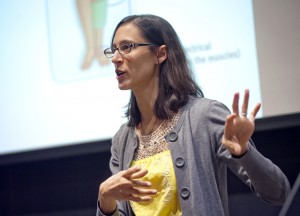What if a patient who suffers from depression could get help in the heat of an argument instead of waiting until his or her next therapy appointment? As mobile technology becomes more pervasive, Susan Wenze believes it is an untapped resource with enormous potential to aid treatment for patients with mood disorders.

Professor Susan Wenze teaches in Oechsle Hall.
Mobile technology also is proving to be a vital resource in the lab. Research suggests that people with depression or who are susceptible to depression are particularly sensitive to interpersonal stressors, such as rejection, arguments, etc., explains Wenze, assistant professor of psychology. In the lab, researchers can ask patients about recent stressors and their reactions, but asking after the fact leads to memory errors and recall biases. With mobile technology, researchers can ask patients about their stressors in the moment, yielding more accurate data on what patients are actually experiencing.
Wenze is fascinated as much by what researches do not know as she is by what they do know. For example, bipolar disorder was thought to be strictly a biologically- and genetically-based disorder, until recently when psychologists started taking a fresh look to see what the field can offer in the way of treatment.
“Virtually everyone has had some experience with depression, bipolar disorder, or dysthymia (low-grade depression),” says Wenze. “That said, we still don’t know all there is to know about how emotions and thoughts are processed in depression, and psychologists have hardly studied bipolar disorder in this way at all. With so many of us using mobile technologies in our daily lives, we are uniquely situated right now to start studying these disorders and delivering treatment using such technology.”
In a previous study, Wenze and her colleagues found that a twice daily mobile intervention over a two-week period was enough to improve adherence behaviors and depressive symptoms in patients with bipolar disorder. This technology, she says, could load therapeutic exercises via software to help patients experiencing trigger symptoms in the moment that they could then review with their therapist at a future appointment.
This summer, Wenze enlisted the help of Dana Ahern ’15 (Rockville Centre, N.Y.), a double major in psychology and art, to accompany her to the TwinsDays Festival in Twinsburg, Ohio, for her latest study. Wenze is collecting data from parents of multiples (twins, triplets, etc.) about mental health difficulties experienced during the perinatal period and the types of treatments that might have been helpful. Grace Marchena ’15 (Hopatcong, N.J.), a double major in psychology and English, is Wenze’s current research assistant.
Wenze and her collaborators believe that this population experiences unique barriers to treatment, such as financial strain, medical complications for the mothers or babies, time management, or childcare, making mobile health interventions especially useful. The research team plans to use the data to develop and test a tailored intervention for mental health concerns in this population.
Having joined the faculty this fall, Wenze is eager to include more students in her research as well as mentor them in their own research endeavors.
“Research is fascinating, and I love to share that enthusiasm with my students,” she says. “It’s easy to get bogged down in details as an academic with a very specific area of expertise; students often help me consider the bigger picture questions or think about topics in a new way. And students are invaluable for me to actually get proposals written, data entered, and participants run.”
